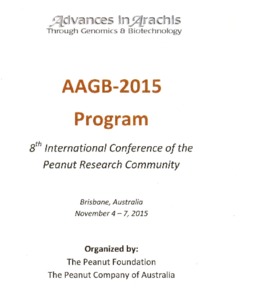Evaluation of multiple stress tolerant groundnut genotypes for productivity and nutritional quality in Nigeria
Abstract
Groundnut plays a very important economic role for smallholder farmers in the semi-arid tropics as a major cash crop for many households; a nutritious and safe food thereby contributing to improved health of the rural population. It is rich in protein, oil and micronutrients such as iron and zinc. High iron and zinc contents are especially beneficial for women and children at risk of anemia and have proven to be genetically malleable. High oleic acid and low linoleic acid make groundnut oil ideal for storage and better human health. Evaluation of 541 advanced breeding lines along with locallandraces and improved varieties for their reaction to drought, rosette and foliar diseases besides productivity parameters over two locations during 2014 main season resulted in identification of 45 promising lines with significantly superior pod yield (1304-2796 kg/ha) compared to check entries (189-1005 kg/ha). Further, these superior genotypes were evaluated for nutritional quality and in trials during 2014115 dry season to confirm their superiority. Nutritional quality (oil, OIL ratio, protein, Fe and Zn content) analyses lead to the identification of nutritionally dense genotypes. Genotypes ICGV IS 11060, Samnut 23, ICGV 00064, ICGV 01276, ICGV IS 07827 and Kampala had high oil content (53-54%); while ICGV 07813 had high OIL ratio of 6.1 followed by ICGV IS 09992, ICGV SM 05593 and ICGV SM 06722 with 3.0 OIL ratio. Genotypes ICGV IS 07833, ICGV IS 3980, ICGV SM 08553 and rCG 5891 had high protein (30-32%), Zn (46-51 ppm) and Fe (23-34 ppm) content. These serve as ideal genetic resources to develop agronomically superior and nutritionally enhanced groundnut cultivars with multiple resistances to biotic and abiotic stresses

